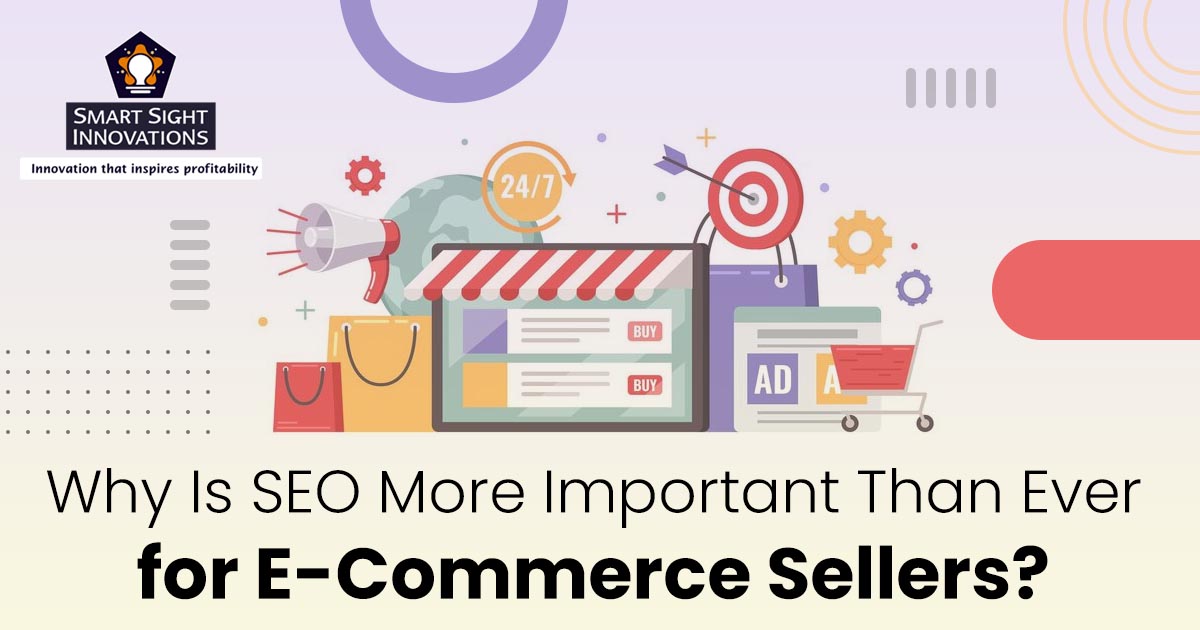
E-commerce store owners face increasing competition and shifting consumer behaviors. Adding to this challenge is the phenomenon of “ad blindness.” Consumers are increasingly adept at filtering out intrusive advertisements.
Banner blindness and a general skepticism towards paid search ads are leading to a decline in their effectiveness. Here’s where SEO shines. Amidst this landscape, search engine optimization (SEO) has emerged as a critical factor for online success.
SEO has advanced significantly since its inception. In the early days of the internet, it was a straightforward process involving keyword stuffing and backlink spamming. However, as search engines like Google evolved, their algorithms became more sophisticated, focusing on delivering the best possible user experience.
For e-commerce sellers, understanding this evolution is crucial to leveraging SEO effectively. Now more than ever, SEO plays a pivotal role in driving organic traffic, enhancing visibility, and boosting sales for e-commerce businesses.
This article explores the growing importance of SEO in the e-commerce sector, highlighting its impact on customer acquisition, brand credibility, and long-term sustainability in an increasingly crowded online marketplace.
The Rise of Ad Blindness and Paid Search Fatigue
Imagine while scrolling through a website or social media feed, banners, pop-ups, and pre-roll ads bombard you from every corner. After a while, you start to subconsciously tune them out. This is ad blindness, a well-documented phenomenon where users become desensitized to traditional online advertisements.
Paid search advertising, like Google Ads, can be a powerful tool. However, relying solely on it can lead to paid search fatigue. This occurs when users become weary of seeing the same sponsored ads at the top of search results pages (SERPs) for every relevant search term.
For e-commerce sellers, ad blindness and paid search fatigue pose a significant threat. While paid advertising can still be a valuable tool, it shouldn’t be the only one. By focusing on SEO and building a strong organic presence, you can attract potential customers who are actively searching for products you offer, leading to higher conversion rates and a more sustainable business model.
Why Is E-Commerce SEO More Important Than Ever?
E-commerce SEO is not just a way to improve website traffic; it’s a strategic investment in your business’s long-term success. Below are some key reasons why e-commerce SEO is so important:
1. Increased Online Visibility
The primary goal of SEO is to improve the visibility of your e-commerce site on search engines like Google. When potential customers search for products you offer, you want your store to appear at the top of the search results.
Higher visibility leads to increased brand awareness, making your store more likely to be chosen over competitors. Since most users don’t go beyond the first page of search results, appearing on that first page is crucial.
2. Driving Organic Traffic
Organic traffic refers to visitors who find your website through search engine results, as opposed to paid advertising or direct visits. E-commerce SEO focuses on optimizing your site to rank well for relevant keywords, driving high-quality traffic to your store.
These visitors are already searching for products similar to yours, making them more likely to convert into customers. By consistently driving organic traffic, you can build a reliable and sustainable source of visitors.
3. Cost-Effectiveness
Compared to other marketing strategies, SEO is relatively cost-effective. While it requires an initial investment in terms of time and resources, the ongoing costs are lower than those of paid advertising. Once your e-commerce site starts ranking well, you can enjoy a steady stream of organic traffic without having to continually pay for ads. This makes SEO a cost-efficient way to generate leads and sales over the long term.
4. Enhanced User Experience
Search engines prefer websites that provide a positive user experience, including fast loading times, easy navigation, and mobile-friendly design. By focusing on these elements, you can create a better shopping experience for your customers, which can lead to higher conversion rates and customer satisfaction.
5. Higher Conversion Rates
Visitors who find your site through organic search are often more motivated and ready to buy compared to those who come from other channels. By targeting the right keywords and optimizing your product pages, you can attract high-intent visitors who are looking for exactly what you offer. This leads to higher conversion rates, meaning more sales and revenue for your e-commerce business.
6. Building Credibility and Trust
Ranking high in search results helps build credibility and trust with potential customers. Users tend to trust websites that appear on the first page of search results more than those that don’t. High search rankings signal to users that your e-commerce site is reputable and offers quality products or services.
7. Competitive Advantage
Effective SEO can give you a competitive edge by ensuring that your site ranks higher than your competitors for relevant keywords. This not only drives more traffic to your site but also helps you capture market share and stay ahead of the competition.
8. Local SEO for Targeting Local Customers
For e-commerce businesses that also have a physical presence or serve specific regions, local SEO is crucial. Optimizing your site for local search terms and ensuring your business is listed in local directories can help you attract nearby customers. Local SEO can drive foot traffic to your store and increase online sales from local customers who prefer shopping within their community.
9. Long-Term Results
Unlike paid advertising, which stops generating traffic once you stop paying for ads, SEO offers long-term results. Maintaining high rankings after you’ve attained them takes less work than the original optimization. Your site can continue to attract organic traffic and generate sales for months or even years, providing a lasting return on your investment.
10. Adapting to Changing Consumer Behavior
Consumer behavior is constantly evolving, with more people turning to online shopping. By investing in e-commerce SEO, you can adapt to these changes and ensure your business remains relevant. SEO helps you understand and respond to consumer search trends, allowing you to optimize your site for the keywords and phrases that your target audience is using.
How SEO Compares with Paid Advertising
Acquiring customers efficiently is crucial for sustainable growth. SEO has emerged as a highly cost-effective strategy for customer acquisition, especially when compared to paid advertising.
1. Initial Investment vs. Ongoing Costs:
Paid advertising, such as Pay-Per-Click (PPC) campaigns, requires a continuous financial investment. Every click costs money, and once you stop paying, the traffic stops. In contrast, SEO involves an upfront investment in time and resources to optimize your website and content. While it may take longer to see results, the benefits can be long-lasting without the need for constant financial input.
2. Sustainability of Results:
PPC campaigns provide immediate visibility, but this visibility disappears as soon as the campaign ends. SEO, on the other hand, builds a foundation for long-term organic visibility. Once your pages rank well for relevant keywords, they can continue to drive traffic for an extended period, even with minimal ongoing maintenance.
3. Trust and Credibility:
Users often perceive organic search results as more trustworthy than paid ads. Many consumers have developed “ad blindness” and tend to skip over paid listings. High organic rankings can lend credibility to your e-commerce store, potentially leading to higher click-through rates and conversions.
4. Broader Reach:
While paid ads target specific keywords, a well-executed SEO strategy can help your site rank for a wide range of relevant terms, including long-tail keywords. This broader reach can attract diverse segments of your target audience, often capturing potential customers at various stages of the buying journey.
Long-Term Benefits of Organic Traffic
1. Compound Growth:
As you consistently optimize your site and create valuable content, your organic traffic can compound over time. Each piece of optimized content has the potential to rank for multiple keywords, creating numerous entry points for potential customers.
2. Higher ROI Over Time:
While the initial investment in SEO might be substantial, the long-term return on investment (ROI) can be significant. As your organic traffic grows, your cost per acquisition tends to decrease, leading to improved profitability.
3. Brand Awareness and Recognition:
Consistent organic visibility for relevant searches helps build brand awareness. Even if users don’t click through immediately, repeated exposure to your brand in search results can lead to increased recognition and trust over time.
4. Adaptability to Market Changes:
A solid SEO foundation makes it easier to adapt to market changes and emerging trends. By monitoring search patterns and adjusting your strategy accordingly, you can stay ahead of the competition and capture new opportunities as they arise.
5. Valuable Market Insights:
SEO efforts provide valuable data about your target audience’s search behavior, preferences, and pain points. This information can inform product development, content strategy, and overall business decisions, leading to better alignment with customer needs.
While paid advertising has its place in a comprehensive marketing strategy, the cost-effectiveness and long-term benefits of SEO make it an indispensable tool for e-commerce sellers. By investing in SEO, businesses can build a sustainable foundation for customer acquisition, improve brand credibility, and achieve better long-term ROI in an increasingly competitive online marketplace.













